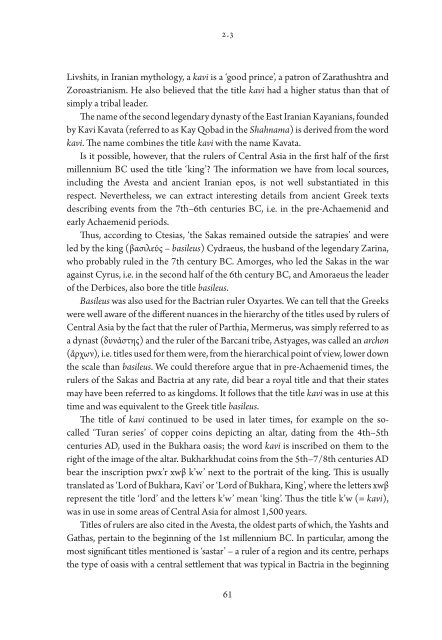You also want an ePaper? Increase the reach of your titles
YUMPU automatically turns print PDFs into web optimized ePapers that Google loves.
2 .3<br />
Livshits, in Iranian mythology, a kavi is a ‘good prince’, a patron <strong>of</strong> Zarathushtra and<br />
Zoroastrianism. He also believed that the title kavi had a higher status than that <strong>of</strong><br />
simply a tribal leader.<br />
The name <strong>of</strong> the second legendary dynasty <strong>of</strong> the East Iranian Kayanians, founded<br />
by Kavi Kavata (referred to as Kay Qobad in the Shahnama) is derived from the word<br />
kavi. The name combines the title kavi with the name Kavata.<br />
Is it possible, however, that the rulers <strong>of</strong> Central <strong>Asia</strong> in the first half <strong>of</strong> the first<br />
millennium BC used the title ‘king’? The information we have from local sources,<br />
including the Avesta and ancient Iranian epos, is not well substantiated in this<br />
respect. Nevertheless, we can extract interesting details from ancient Greek texts<br />
describing events from the 7th–6th centuries BC, i.e. in the pre-Achaemenid and<br />
early Achaemenid periods.<br />
Thus, according to Ctesias, ‘the Sakas remained outside the satrapies’ and were<br />
led by the king (βασιλεύς – basileus) Cydraeus, the husband <strong>of</strong> the legendary Zarina,<br />
who probably ruled in the 7th century BC. Amorges, who led the Sakas in the war<br />
against Cyrus, i.e. in the second half <strong>of</strong> the 6th century BC, and Amoraeus the leader<br />
<strong>of</strong> the Derbices, also bore the title basileus.<br />
Basileus was also used for the Bactrian ruler Oxyartes. We can tell that the Greeks<br />
were well aware <strong>of</strong> the different nuances in the hierarchy <strong>of</strong> the titles used by rulers <strong>of</strong><br />
Central <strong>Asia</strong> by the fact that the ruler <strong>of</strong> Parthia, Mermerus, was simply referred to as<br />
a dynast (δυνάστης) and the ruler <strong>of</strong> the Barcani tribe, Astyages, was called an archon<br />
(ἄρχων), i.e. titles used for them were, from the hierarchical point <strong>of</strong> view, lower down<br />
the scale than basileus. We could therefore argue that in pre-Achaemenid times, the<br />
rulers <strong>of</strong> the Sakas and Bactria at any rate, did bear a royal title and that their states<br />
may have been referred to as kingdoms. It follows that the title kavi was in use at this<br />
time and was equivalent to the Greek title basileus.<br />
The title <strong>of</strong> kavi continued to be used in later times, for example on the socalled<br />
‘Turan series’ <strong>of</strong> copper coins depicting an altar, dating from the 4th–5th<br />
centuries AD, used in the Bukhara oasis; the word kavi is inscribed on them to the<br />
right <strong>of</strong> the image <strong>of</strong> the altar. Bukharkhudat coins from the 5th–7/8th centuries AD<br />
bear the inscription pwx’r xwβ k’w’ next to the portrait <strong>of</strong> the king. This is usually<br />
translated as ‘Lord <strong>of</strong> Bukhara, Kavi’ or ‘Lord <strong>of</strong> Bukhara, King’, where the letters xwβ<br />
represent the title ‘lord’ and the letters k’w’ mean ‘king’. Thus the title k’w (= kavi),<br />
was in use in some areas <strong>of</strong> Central <strong>Asia</strong> for almost 1,500 years.<br />
Titles <strong>of</strong> rulers are also cited in the Avesta, the oldest parts <strong>of</strong> which, the Yashts and<br />
Gathas, pertain to the beginning <strong>of</strong> the 1st millennium BC. In particular, among the<br />
most significant titles mentioned is ‘sastar’ – a ruler <strong>of</strong> a region and its centre, perhaps<br />
the type <strong>of</strong> oasis with a central settlement that was typical in Bactria in the beginning<br />
61


